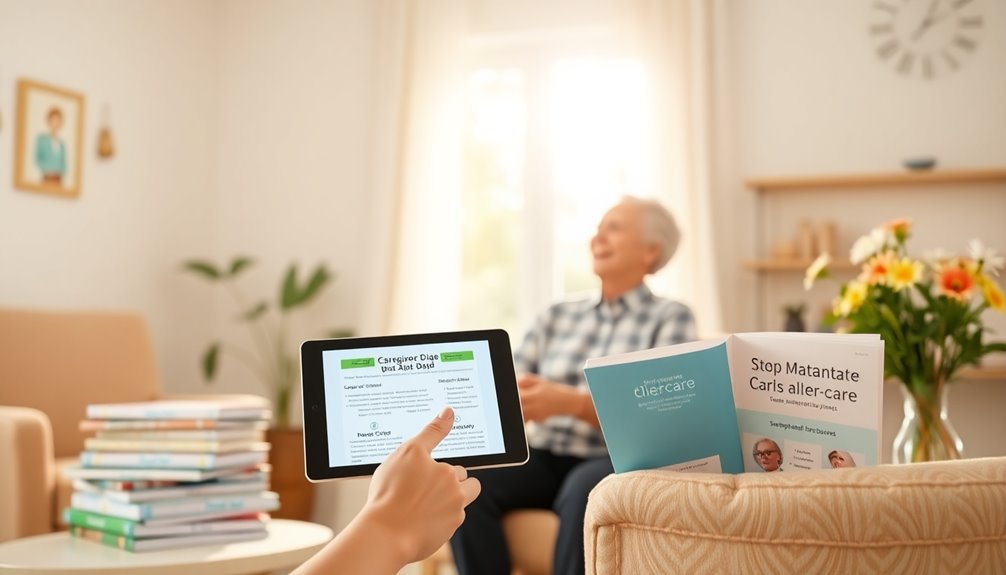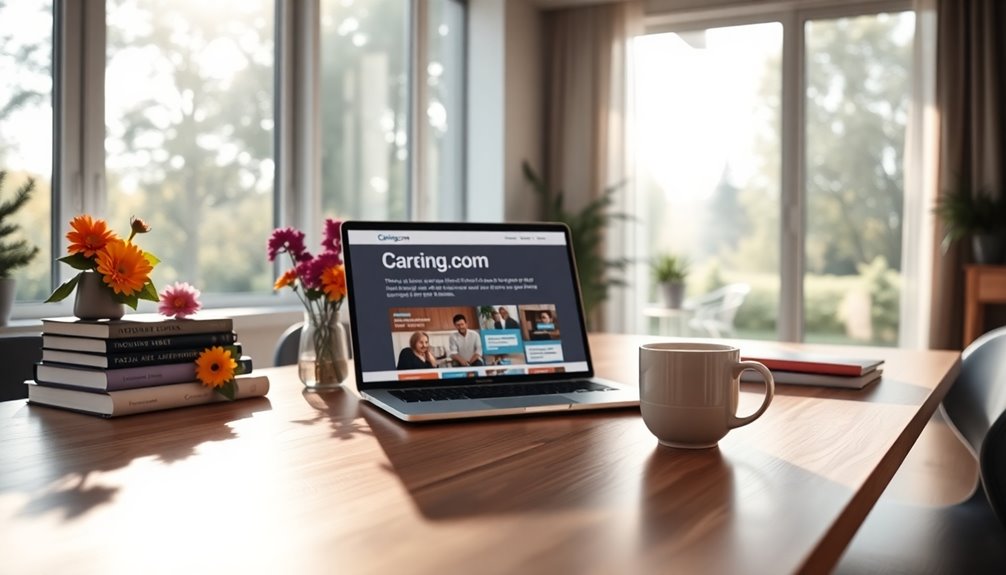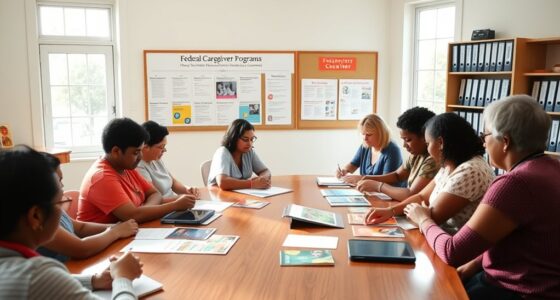If you're looking for expert-recommended caregiving resources, check out AARP Family Caregiving for guides and support, the Alzheimer's Association's 24/7 Helpline for assistance, and the American Cancer Society for coping strategies. The Family Caregiver Alliance offers community connections, while the National Caregivers Library provides essential articles and checklists. Don't forget the Eldercare Locator for local services, the National Institute on Aging for educational materials, and the ARCH National Respite Network to prevent burnout. More valuable insights await you!
Key Takeaways
- AARP Family Caregiving Resources provides essential guides and legal checklists tailored for family caregivers, along with self-care tips to reduce stress.
- The Alzheimer's Association offers a 24/7 helpline, support groups, and personalized care plans to assist caregivers of individuals with dementia.
- ARCH National Respite Network connects caregivers with local respite care programs, promoting caregiver well-being and reducing burnout.
- The National Caregivers Library features comprehensive articles, forms, and checklists to aid in effective care planning and management.
- Caring.com offers an online forum for caregiver support, along with valuable articles and tips for managing aging and health conditions.
AARP Family Caregiving

AARP Family Caregiving offers essential caregiver resources that can ease your journey.
You'll find extensive care guides, legal checklists, and support tailored specifically for family caregivers, helping you organize and plan effectively. If you're a first-time caregiver, the specialized resources available can boost your confidence in steering caregiving challenges. Additionally, exploring sleep training methods can provide valuable insights for caregivers managing infants. Establishing clear rules can also help in creating a structured environment for both caregivers and those they care for.
AARP emphasizes self-care, providing tips to manage stress while ensuring your well-being. Plus, with access to crucial information on benefits, insurance, and financial issues, you'll be empowered to make informed decisions. Incorporating pet therapy into your caregiving approach can enhance emotional well-being for both you and your loved one.
Connecting with the AARP community enhances your support network and raises awareness about caregiver needs, ensuring you're not alone on this path.
Alzheimer's Association

As you navigate the challenges of caregiving for someone with Alzheimer's, the Alzheimer's Association stands ready to support you.
They offer essential resources designed specifically for caregivers like you, ensuring you have the information and support you need for effective dementia care.
Here are four key resources you can access:
- 24/7 Helpline: Call 1-800-272-3900 for professional advice anytime.
- Comprehensive Website: Explore educational materials and care tips.
- Community Programs: Join support groups and workshops to connect with others.
- Care Navigator Tool: Create personalized care plans tailored to individual needs.
The Alzheimer's Association is dedicated to empowering caregivers and enhancing the quality of life for those affected by Alzheimer's disease.
American Cancer Society

The American Cancer Society offers a valuable Caregiver Resource Guide that equips you with essential tips and emotional support for managing cancer care.
You can also access educational materials and connect with support networks through their online community.
Whether you need immediate help or want to learn coping strategies, they've got resources to assist you every step of the way.
Caregiver Resource Guide
Steering the journey of caregiving for a cancer patient can feel overwhelming, but the American Cancer Society's Caregiver Resource Guide is here to help.
This thorough guide offers essential information and support tailored for you as a caregiver, addressing your unique challenges.
Here are four valuable resources included:
- Tips for managing care effectively.
- Coping strategies to maintain your well-being.
- Connections to local support groups.
- Insights on advocating with healthcare teams.
Educational Materials Available
Steering through the complexities of caregiving becomes more manageable with the educational materials available from the American Cancer Society.
Their extensive Caregiver Resource Guide provides essential information and tools that help you understand your caregiving responsibilities, emotional support needs, and self-care strategies. You'll find downloadable booklets filled with tips on managing stress while caring for your loved one.
Additionally, the Society offers workshops and webinars that empower you with knowledge on traversing the healthcare system, understanding treatment options, and managing side effects.
These resources not only enhance your skills but also highlight the importance of self-care. With this wealth of educational materials, you can better support your loved one and maintain your own well-being throughout the caregiving journey.
Support Networks Connection
While steering through the challenges of caregiving, connecting with support networks can make a significant difference. The American Cancer Society offers invaluable resources to help you navigate this journey.
Here are four ways you can benefit:
- 24/7 Helpline: Get immediate support and advice from trained professionals whenever you need it.
- Local Chapters: Connect family caregivers with others facing similar challenges for shared experiences and encouragement.
- Workshops: Participate in educational events that empower you with skills for effective caregiving.
- Online Community: Join their online platforms for ongoing education and support, no matter where you are.
Utilizing these resources not only enhances your caregiving skills but also provides emotional strength during difficult times.
Family Caregiver Alliance

If you're managing the challenges of caring for a loved one with a chronic health condition, the Family Caregiver Alliance (FCA) can be an invaluable resource. This nonprofit organization focuses on family caregiving, addressing the long-term care needs of families and friends.
Through its Family Care Navigator tool, you can find state-specific resources and referrals for legal, financial, and supportive services. FCA also offers educational materials, including articles and guides, to help you develop the knowledge and skills needed for effective care, including information on digital literacy programs that can assist seniors in using technology. Additionally, caregivers can connect through online forums and support groups, fostering a sense of community. With FCA's advocacy efforts, you can also stay informed about policies that impact family caregivers at local, state, and national levels. Furthermore, caregivers are encouraged to seek professional counseling to navigate the emotional complexities of caregiving. Additionally, understanding legal requirements for family caregiving can help ensure that you are compliant with any necessary regulations.
National Caregivers Library

- Hundreds of articles covering various caregiving challenges.
- Essential forms and checklists for effective care planning.
- Resources on legal and financial matters to ease your burden, including divorce statistics that can help with understanding potential family dynamics. Additionally, the library provides insights on nutritional requirements essential for caregivers managing dietary needs.
- Support for medication management and meal planning tailored to specific health conditions.
With extensive information on healthcare providers and the services provided, the National Caregivers Library serves as a clearinghouse for free resources. Understanding emotional stability during caregiving can significantly enhance your ability to provide support.
It's an invaluable tool for caregivers seeking guidance and support on their journey.
Caregiver Action Network

The Caregiver Action Network (CAN) is an essential resource for family caregivers seeking support and guidance.
You'll find a thorough toolbox filled with articles, how-tos, and videos that address various caregiving challenges. CAN offers a supportive forum where you can connect with peers, share experiences, and get helpful advice on managing stress and understanding medical conditions.
This organization emphasizes the importance of community resources to strengthen your support system. Additionally, CAN provides educational materials designed to empower you with the knowledge and skills necessary for effective care management.
Eldercare Locator

Building on the support offered by organizations like the Caregiver Action Network, the Eldercare Locator serves as an essential tool for connecting older adults and caregivers with local services.
This public service helps you find resources for your loved ones' healthcare needs through an easy-to-use online directory.
Here are four key features:
- Zip Code Search: Quickly locate services in your area.
- Transportation & Housing: Access assistance for essential aging-related issues, including assisted living expenses that vary by location.
- Caregiver Support: Find resources tailored to your needs.
- Real-Time Chat: Get expert help instantly.
Additionally, it's crucial to understand the importance of routine health checks for maintaining the well-being of older adults.
National Institute on Aging

The NIA is dedicated to promoting healthy aging through research and education. You can find extensive online resources that cover age-related health conditions, including Alzheimer's disease, which is critical for National Family Caregivers. Additionally, it is important for caregivers to be aware of Louisiana alimony laws, as financial strains may impact the overall well-being of older adults. Understanding the physical effects of narcissistic abuse can also be vital for caregivers, as it may help them recognize signs of distress in their loved ones. The institute offers educational materials that help you navigate caregiving challenges and access the latest research findings. Furthermore, the NIA acts as a hub for community-based programs, connecting you with local organizations that provide important services for older adults. This way, you can guarantee your loved one receives the best support possible while you manage the caregiving journey. Furthermore, awareness of breast cancer symptoms is crucial for caregivers to help monitor the health of their loved ones effectively.
ARCH National Respite Network

If you're a family caregiver, the ARCH National Respite Network can be a game-changer for you.
With an extensive database of respite programs, you can easily find services that fit your needs.
Plus, ARCH focuses on your well-being, offering resources that help reduce burnout and improve your quality of life.
Respite Programs Availability
How can caregivers find the support they need when juggling their responsibilities? The ARCH National Respite Network is here to help you access valuable respite care options.
Here are four ways they can assist you:
- Comprehensive Database: Explore a vast range of respite services tailored for older adults.
- National Respite Locator: Use this tool to search for local respite care based on your state and zip code.
- Diverse Options: Choose from in-home care, adult day care, or overnight facilities suited for specific health conditions.
- Financial Assistance: Many states offer programs to help cover respite care costs, making it easier for families to find relief.
With these resources, you can guarantee both you and your loved ones receive the support needed.
Caregiver Well-being Focus
Finding respite care is just one aspect of supporting caregivers; their overall well-being is equally important.
The ARCH National Respite Network emphasizes caregiver well-being by connecting you with local respite care programs tailored to your specific needs. With access to an extensive database of services, you can find relief from caregiving responsibilities in your state, allowing you to recharge and manage stress effectively.
This proactive approach promotes not only your health but also the quality of life for those you care for. By prioritizing your well-being and utilizing resources related to Elder Law and senior living, you can prevent burnout and maintain a balanced life, ensuring both you and your loved ones thrive.
Caring.com

Caring.com serves as an essential lifeline for family caregivers, offering a rich array of articles, tips, and advice on aging and health conditions.
You can find invaluable resources to help you navigate caregiving, including:
- A thorough database of assisted living and in-home care providers to help you make informed decisions.
- An online forum where you can connect with other caregivers for emotional support.
- Support groups that foster community interaction and idea exchange.
- Guides to aid you in understanding medical care for your family members.
In addition, the platform emphasizes the importance of transforming spaces to enhance the quality of life for seniors, ensuring a more comfortable living environment.
With Caring.com, you're not just finding information; you're engaging with a community that understands the complexities of caregiving, making your journey a little easier. Additionally, they provide insights into required minimum distributions that can help caregivers optimize their financial planning for elderly family members.
Frequently Asked Questions
What Resources Do Caregivers Need Most?
As a caregiver, you need a variety of resources to support both you and your loved one. Access to educational materials about specific health conditions is essential.
Emotional support through online communities can help you connect with others facing similar challenges. Practical tools like care coordination apps will keep your schedules organized.
Finally, understanding legal and financial aspects of care can ease your worries, while respite services allow you to recharge when needed.
Does AARP Pay for Caregivers?
You might think AARP directly pays for caregivers, but that's not the case.
Instead, they offer valuable resources to help you navigate caregiving costs. You'll find guides on financial assistance options like Medicaid and veterans' benefits.
AARP membership also gives you access to discounts and tools that can ease expenses. Plus, they advocate for policies that support family caregivers, encouraging you to explore state-specific programs for potential financial aid.
Does Medicare Pay for Caregivers for Seniors?
Medicare doesn't typically pay for personal caregivers or non-medical home care services. It mainly covers medical services and skilled nursing care.
However, if you or a senior you're caring for needs skilled nursing or therapy, Medicare might cover home health care, but only through a Medicare-certified agency.
You can also check state Medicaid programs, as they may offer additional benefits for home care services that Medicare doesn't cover.
How Much Do Family Members Get Paid for Caregiving?
Think of family caregiving as a delicate dance, where the rhythm of support can also bring financial rewards.
Depending on your state and the care needed, you might earn anywhere from $10 to $25 an hour. Programs like Medicaid's HCBS waivers or state-specific initiatives can help compensate you for your efforts.
Plus, tax credits may provide additional financial relief, making your caregiving role not just a labor of love, but also a potential source of income.
Conclusion
In your journey as a caregiver, these top-rated resources can make all the difference. Whether you need support, information, or a break, each organization offers valuable tools to help you thrive. Remember, you're not alone in this; countless others are traversing similar paths. Isn't it comforting to know there are expert-backed resources ready to assist you? Embrace the support available, and don't hesitate to reach out—you deserve it!









